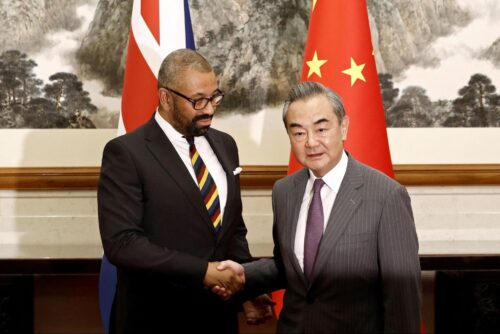U.S. campaign against Huawei stalls as Europe becomes main battleground

The U.S. is now arguing that using Huawei equipment would endanger the privacy and liberty of citizens, and the security of critical infrastructure and national security systems. Nobody was making this argument in 2018. What changed?
The annual Mobile World Congress in Barcelona is normally dominated by displays of cutting-edge mobile technology, with global telecom executives flitting in and out of back rooms signing deals. At this year’s MWC Barcelona, which took place from February 25-28, a large U.S. government delegation showed up and lobbed a political stink bomb into the proceedings.
FCC chairman Ajit Pai and senior officials from the State and Defense Departments held a news conference during MWC Barcelona in which they cautioned European governments and carriers about choosing Chinese suppliers for their new high-speed networks (statement here). A day earlier, Huawei rotating chairman Guo Ping, in a keynote address, accused the U.S. of hypocrisy for attacking the company as a security threat without evidence. He pointed to a major U.S. intelligence program that exploited telecommunications networks and targeted Huawei itself — leaked by NSA contractor Edward Snowden in 2013. He even had a slideshowing a prism, a reference to the infamous NSA surveillance program, code-named PRISM.
The dueling narratives showed how the geopolitics of 5G had arrived at MWC in spades, threatening to split the industry and disrupt plans for rolling out next-generation mobile services and the innovation they will enable.
The past year has seen a sea change in the politics around 5G, driven by the U.S. government’s effort to limit or ban Chinese firms, concerned about both the security of 5G networks and the growing market dominance of Huawei Technologies in particular.
In the lead-up to the Barcelona gathering, conference organizer and industry trade group GSMA jumped into the controversy, issuing a statement that appeared to take sides on the issue, apparently without getting broad agreement from its board members. The GSMA statement called out broader industry concerns that are not universally shared, but represent those of the bulk of European carriers: banning specific companies from European networks would drive up costs and delay the rollout of 5G across the bloc.
Despite the U.S. tough talk in Barcelona, its campaign against Huawei in Europe is struggling. Leading European markets like the UK and Germany are wavering on the idea of an outright ban — with Germany last week announcing it would toughen security requirements for all vendors, stopping short of singling out Huawei.
A U.S. argument that initially emphasized risks to allies from Huawei-enabled espionage or even sabotage of critical networks has evolved and is now focused on persuading carriers in Europe to “avoid vendors that could compromise the integrity of global communications technology.” The U.S. is now arguing in a fairly sweeping fashion that using Huawei equipment would endanger the privacy and liberty of citizens, and the security of critical infrastructure and national security systems. Nobody was making this argument in 2018. What changed?
Huawei – and its beleaguered CFO, who has been cooling her heels while out on bail in a Vancouver mansion – is asking the same question. The answer revolves around growing U.S. government concerns over the dominance of Huawei in the networks of allies and “like-minded” democracies in Europe and Asia, and the very nature of 5G networks, which will carry substantial amounts of critical infrastructure data, and be a major enabler of high-tech military operations for militaries with a global reach.
The timing, particularly for Europe, could not have been worse. Huawei already has a presence in a large portion of the bloc’s carriers already dependent on Chinese equipment for between 50 to 90 percent of key parts of their 4G networks. Now, for European governments that are preparing big auctions of 5G spectrum — and are not used to thinking up novel ways to ban companies from doing things in Europe — the reaction has been: you are telling me this now?
For Europeans, the U.S. needs to make a stronger legal commitment and not just push for a ban. It is easy for the U.S. to argue for a ban, since there is no Huawei equipment in its major networks. Europe requires a different approach.
European leaders are also frustrated that the United States has still not enacted laws or executive authorities that formally prevent carriers from using Chinese equipment in its mobile networks, despite a de facto ban being in place for some time. Europe does not want to be out front of the U.S. on this, and finds itself caught in a long-term tech conflict between two superpowers, even as it tries to define what Europe’s role will be in the next round of technological advancement being defined by 5G, AI, and mobility services.
EU member state governments are virtually all divided on the issue of Huawei, between the security services on one side — who are receptive to U.S. concerns — and the economic and trade departments and business communities on the other, eager not to anger Beijing. Smaller countries that are strong free-trade advocates or depend more heavily on Chinese investment are not eager to see new restrictions. But Europe is being asked to come up with a solution quickly, and it will not be easy or pretty. Europe in particular will not enact any type of ban, or name specific companies, in any new measures to increase supply chain security and reduce dependence on Chinese telecom equipment.
EU officials view the recent action taken by Huawei to legally challenge language in the U.S. National Defense Authorization Act (NDAA) naming the firm and banning it from participating in U.S. government procurement as a veiled threat to EU governments debating the issue. No EU or member state government document on the issue will explicitly call out Chinese companies by name. But the EU and key member states such as the UK and Germany will take some limited action, short of ban but raising technical hurdles for vendors and putting the onus on carriers to ensure the security of their networks.
The European Union’s governing bodies are likely to take action on the issue of securing 5G supply chains in the coming weeks. The UK and Germany will also issue new reports dealing with supply chain security and the economics driving the rollout of 5G networks. Europe is groping for an interim solution that shows it is sensitive to U.S. concerns but is not fully buying in to the U.S. proposition that a full ban is desirable or feasible. For Europeans, the U.S. needs to make a stronger legal commitment and not just push for a ban. It is easy for the U.S. to argue for a ban, since there is no Huawei equipment in its major networks. Europe requires a different approach.
The struggle between the U.S. government, intent on undermining Huawei’s business model globally, and one of China’s leading multinational companies, will go on and likely get messier. Meng’s extradition hearing is set for May 8, but there is probably a deal in the works to release her as part of the U.S.-China trade negotiations and find a face-saving solution to this knotty issue. Huawei’s new and more combative approach will make it difficult for the company to admit wrongdoing and accept a fine and other punishments of the type ZTE agreed to. And then there are the Huawei hawks in the U.S., intent on taking the company down some way, somehow.
This group, centered in the law enforcement and national security communities, wants to push harder on Huawei, even considering slapping a denial order on the Chinese tech giant of the type that nearly felled ZTE last summer. Ironically, the very dependence of Europe on Huawei will likely preclude that option: carrier there would need more than a year and huge costs in order to adjust if Huawei was slapped with an order. Administration hawks realize that and will go along with a plan to reduce dependence gradually that Europeans themselves have come up with. While a year ago none of this was on the radar, it is now occupying the minds of European leaders and parliamentarians and will carry over beyond new elections set for May. Whether it likes it or not, Europe is both a battleground and a key actor in the evolving U.S.-China Tech Cold War.
With an assist from Kevin Allison at Eurasia Group. See our paper on 5G here: The Geopolitics of 5G






